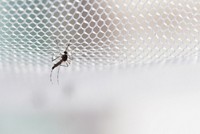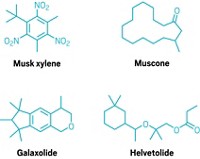Advertisement
Grab your lab coat. Let's get started
Welcome!
Welcome!
Create an account below to get 6 C&EN articles per month, receive newsletters and more - all free.
It seems this is your first time logging in online. Please enter the following information to continue.
As an ACS member you automatically get access to this site. All we need is few more details to create your reading experience.
Not you? Sign in with a different account.
Not you? Sign in with a different account.
ERROR 1
ERROR 1
ERROR 2
ERROR 2
ERROR 2
ERROR 2
ERROR 2
Password and Confirm password must match.
If you have an ACS member number, please enter it here so we can link this account to your membership. (optional)
ERROR 2
ACS values your privacy. By submitting your information, you are gaining access to C&EN and subscribing to our weekly newsletter. We use the information you provide to make your reading experience better, and we will never sell your data to third party members.
Biochemistry
Mosquitoes detect human sweat by sniffing for volatile acids
Researchers identify the receptor that helps mosquitoes home in on humans
by Alla Katsnelson, special to C&EN
March 29, 2019

Our body odor may not win us friends on a crowded city bus, but the lineup of volatile compounds wafting from our skin—including amines, carboxylic acids, ketones, and sulfides—is a major draw for female mosquitoes. These swarming pests use the odor we emit, along with other cues, to home in on us for their blood feasts. But how exactly they detect our odorous presence has remained somewhat of a mystery.
Researchers now report that they’ve found a protein expressed in mosquitoes’ antennae that detects human hosts by sniffing out the lactic acid in our sweat (Curr. Biol. 2019, DOI: 10.1016/j.cub.2019.02.045). Designing ways to interfere with this receptor, called Ir8a, and its signaling system could lead to better ways to protect humans from mosquito bites and the infectious diseases they spread, the scientists say.
Past work on the issue had examined whether two types of sensory proteins, called odorant receptors and gustatory receptors, help mosquitoes identify human targets. Gustatory receptors detect carbon dioxide, a mosquito’s first clue that warm-blooded prey is near. When scientists disabled these proteins, they prevented mosquitoes from biting, but the effect wasn’t human-specific. And tampering with odorant receptors didn’t hinder mosquitoes’ attraction to humans.
In the new study, researchers explored the role of another type of olfactory protein called an inotropic receptor, which hadn’t previously been studied in mosquito attraction. They settled on Ir8a because its location in the insects’ antennae suggests it plays a key role in smell, says Joshua I. Raji, the study’s first author and a graduate student in the lab of Matthew DeGennaro, a neurogeneticist at Florida International University.
Raji, DeGennaro, and their colleagues used CRISPR gene editing to inactivate the gene coding for the receptor. Then, Raji stuck his arm in a test box filled with mosquitoes called a uniport olfactometer to see how the insects liked his scent. Three quarters of the wild type mosquitoes came over for a meal within a few minutes, but only half of the mutants did. The same pattern held when 14 other people stuck their arms in the box.
Next, the researchers exposed the mosquitoes to 14 different volatile chemicals found in sweat and recorded the electrical activity these compounds elicited in neurons in the insects’ antennae. To the scientists’ surprise, only acidic compounds elicited a response. “So we concluded that this gene can actually sense acid in human sweat,” Raji says.
Christopher Potter, a neuroscientist at Johns Hopkins University, notes that although the study demonstrates that activating Ir8a is what allows mosquitoes to scope out human targets, it’s not clear that this signaling is specific to humans.
The researchers aim to address this question in future work. Meanwhile, Raji says, they are using the discovery as a platform to develop tools for better mosquito control. For example, adding smelly molecules that mask lactic acid to existing mosquito repellents could improve their efficacy. What’s more, he says, chemicals like lactic acid that activate Ir8a could be used to lure and trap mosquitoes far from where humans hang out.





Join the conversation
Contact the reporter
Submit a Letter to the Editor for publication
Engage with us on Twitter